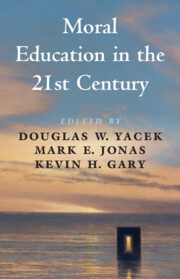Book contents
- Moral Education in the 21st Century
- Moral Education in the 21st Century
- Copyright page
- Contents
- Contributors
- Acknowledgments
- Chapter 1 Why Does Moral Education Matter in the 21st Century?
- Part I Historical Insights for Contemporary Moral Education
- Chapter 2 Plato’s Significance for Moral Education
- Chapter 3 Neo-Aristotelianism and Moral Education
- Chapter 4 Neoskepticism and Moral Education
- Chapter 5 Nietzsche and Moral Education
- Chapter 6 Neo-Kantianism and Moral Education
- Part II New Approaches to Moral Education
- Part III Responses to Contemporary Moral Problems
- Index
- References
Chapter 6 - Neo-Kantianism and Moral Education
from Part I - Historical Insights for Contemporary Moral Education
Published online by Cambridge University Press: 01 June 2023
- Moral Education in the 21st Century
- Moral Education in the 21st Century
- Copyright page
- Contents
- Contributors
- Acknowledgments
- Chapter 1 Why Does Moral Education Matter in the 21st Century?
- Part I Historical Insights for Contemporary Moral Education
- Chapter 2 Plato’s Significance for Moral Education
- Chapter 3 Neo-Aristotelianism and Moral Education
- Chapter 4 Neoskepticism and Moral Education
- Chapter 5 Nietzsche and Moral Education
- Chapter 6 Neo-Kantianism and Moral Education
- Part II New Approaches to Moral Education
- Part III Responses to Contemporary Moral Problems
- Index
- References
Summary
Kant’s contribution to moral education is deep, wide, and operates at several levels, including moral theory, the theory of judgment (both theoretical and moral), ethics and politics, anthropology, and culture. Kant’s pedagogy runs through his “system,” including the three Critiques but also his articles and books detailing empirical concerns, such as, for example, his Anthropology from a Pragmatic Point of View. The scholarship on Kant’s notion of education is equally broad and discusses each and all these themes. A taste of the range of scholarship is provided to the reader who is unfamiliar with the literature on Kant’s pedagogy and the role of it in his theoretical, moral, ethical-political, and cultural accounts. This will extend from a broad introduction of the scholarship to specific scholars and their respective accounts. Finally, five questions bearing on Kant’s account of education and its relationship to his other works and for present circumstances are drawn as indications for future scholarly directions.
- Type
- Chapter
- Information
- Moral Education in the 21st Century , pp. 94 - 112Publisher: Cambridge University PressPrint publication year: 2023

